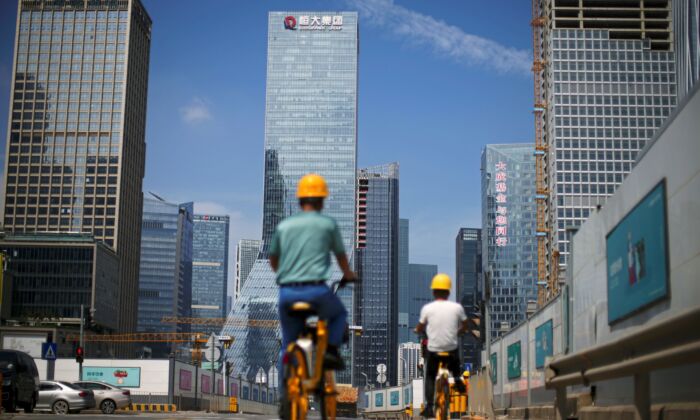
Troubles in China’s property sector are beginning to surface after more developers joined Evergrande’s debacle and are also struggling to pay their debts.
“If Evergrande goes down like this, then I believe this is the domino,” said a Taiwan-based financial expert, as the housing bubble is pushing the property giant to the brink of collapse.
Shares of Chinese real estate firms took a dive in Shanghai stock trading on Oct. 14 as a sub-index tracking shares of Chinese property developers ended the day down 3.9 percent, while the broad index slipped 0.5 percent. Figures show property shares have fallen nearly 20 percent this year.
“Broader financial stress may emerge,” the International Monetary Fund said in an October report, if the situation of Evergrande turns for the worse.
world’s most indebted developer has been seeking to sell billions of its assets, including its Hong Kong headquarters, battling a cash crunch that could swamp the company. Evergrande agreed to sell its stake in Shengjing Bank to a state-owned company for $1.5 billion—just a tiny relief in its $300 billion in liabilities.
With hundreds of projects suspended throughout Chinae, Evergrande has just missed the third round of interest payments on its international bonds this week.
“ gap between the high debt and stock market value is too large,” Taiwanese economic scholar Xie Jinhe said during a New Tang Dynasty (NTD) Television Chinese language program on Oct. 12. Shares of Evergrande on the Hong Kong stock market have plunged 80 percent so far this year.
“[] China-popped real estate bubble has triggered the Evergrande impact,” said Xie.
As the housing bubble grew in China over the past decades, the once stunning Chinese property market saw home buyers pouring hard-earned savings into one apartment after another. Some estimate China’s $5 trillion property sector accounts for around one-quarter of its economy.
“From Beijing to Shanghai to Shenzhen, some of the house price to income ratio has reached 50 to 60 times. … Everyone is highly leveraged with large loans,” according to Xie.
Vulnerability
China’s Evergrande crisis, and its possible domino effect, spotlighted the vulnerability of the housing sector. Debt pressures now extend far beyond what is workable.
Chinese property developers have $556 million worth of high-yield dollar bond coupons due this month, nearly $1.6 billion due before year-end, and Refinitiv data shows at least $92 billion worth of such maturities next year.
On Thursday, Rating agency Fitch downgraded property developer Modern Land to C from B. With $1.35 billion of bonds outstanding, the Beijing-headquartered company is seeking an extension of a bond due in three months to avoid a possible default.
A day earlier, S&P Global Ratings downgraded another two leading Chinese property firms, warning of further cuts.
Fantasia Holdings Group, a minor rival for Evergrande with $415 million stock market value, has a 30-times-higher debt of nearly $13 billion. Last week, the mid-sized developer missed paying $206 million worth of bonds that had matured.
More recently, Shanghai-based homebuilder Sinic Holdings said in an announcement (pdf) on Oct. 11 that it would be unable to repay a $250 million dollar bond due Oct. 18.
“We have to pay close attention to the adjustment of the real estate bubble in China this time,” said Xie. “If there is a major drop, the Chinese economy could be set back for 10 or 20 years.”
Reuters contributed to this report.
Pezou : Chinese Developers Glum as Evergrande Crisis Could Burst Housing Bubble